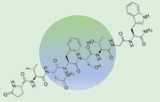Adipokinetic hormones (AKHs) are a family of key neuropeptides in insects, crucial for regulating energy balance and mobilizing fuel reserves. Produced by the corpora cardiaca, AKHs play a vital role in supporting energy-demanding activities like flight, reproduction, and stress responses.
Understanding the Multifaceted Roles of AKHs
- Energy Mobilization: AKHs primarily trigger the release of lipids and carbohydrates (specifically, trehalose) from the fat body into the hemolymph, ensuring sufficient fuel for energy-intensive processes.
- Stress Response: AKH signaling is activated during periods of stress, helping insects cope with challenging conditions by mobilizing energy reserves.
- Analogy to Glucagon: AKHs function similarly to glucagon in mammals, regulating carbohydrate and lipid levels to maintain energy homeostasis.
- AKHR Signaling: AKHs bind to adipokinetic hormone receptors (AKHRs) on fat body cells, initiating intracellular signaling cascades involving Ca2+ and cyclic AMP (cAMP).
- Various other functions: AKH has been implicated in a diversity of additional physiological functions ranging from behavior, locomotion, reproduction to digestion, heart beat control, sleep, immunity, oxidative stress resistance, aging, and muscle contraction.
Research Applications and Emerging Insights
- Insecticide Enhancement: Co-application of AKHs with insecticides such as Isaria fumosorosea can enhance insect mortality, suggesting potential applications in pest control.
- Nutrient Sensing: AKH signaling may be regulated by AMPK, an energy sensor implicated in dietary restriction, exercise, and longevity.
- Vitellogenesis: AKH signaling plays a significant role in vitellogenesis during female reproduction.
- Regulation of body fat and hemolymph levels: During adulthood, however, AKH regulates body fat content and the hemolymph sugar level as well as nutritional and oxidative stress responses.


